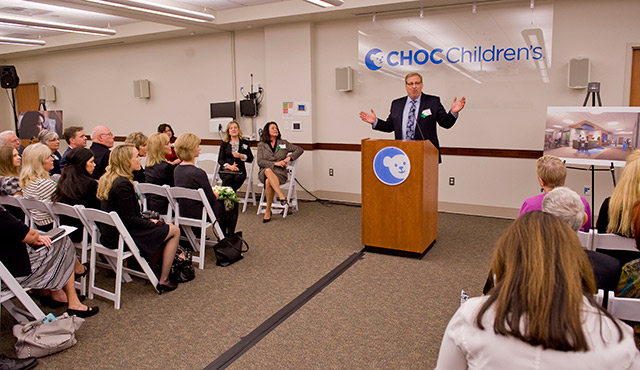On the surface, life seemed perfect. Scottish evangelist Sheila Walsh was at the pinnacle of her career, appearing daily on television as cohost of “The 700 Club.” Then she unraveled during a live broadcast and later that day checked herself in to a psychiatric hospital for a month-long stay.
Today Walsh is a bestselling author with an international ministry. October 8 she shared her experiences with major depression as a featured speaker in the plenary session, “Time to Focus,” presented during the second annual Gathering for Mental Health & the Church held at Saddleback Church in Lake Forest.
“The Lord is close to the broken-hearted,” Walsh assured audience members in the packed sanctuary. “I know that my brokenness is a bridge to others. The Lord said to tell the truth, so I’ve spoken to more than 5 million women over the past eight years about my stay in a mental hospital and my road to recovery.” Walsh’s latest book, “Loved Back to Life,” takes readers on her journey from hopelessness to joy. She said that during that time, God beckoned her to follow and trust him, and he did not let her down.
Because the Centers for Disease Control predicts that more than 50 percent of adults will develop depression, anxiety, eating disorders, bipolar disorder, PTSD, borderline personality disorder, schizophrenia or some other mental illness during their lifetime, Pastor Rick Warren and his wife Kay developed The Gathering on Mental Health & the Church.
The Warrens have struggled with the issue firsthand. Their son, Matthew, took his own life on April 3, 2013 after a lifelong battle with mental illness. Since that time, the Warrens, Saddleback Church’s founders, have joined forces with religious leaders like Bishop Kevin Vann in an effort to help remove the stigma of mental illness.
“God allows us disabilities so that we will need each other,” Pastor Warren said. “My son taught me many lessons. The mentally ill often have insights the rest of us don’t.”
Among many luminaries speaking at the conference were Vice Admiral Vivek Murthy, United States Surgeon General; Michael Botticelli, director of National Drug Control Policy; Congressman Patrick J. Kennedy, founder of The Kennedy Forum and co-founder of One Mind; Thomas R. Insel, director of the National Institute of Mental Health; and Senator Darrell Steinberg, founder of The Steinberg Institute for Advancing Mental Health Policy.
Bishop Vann said he began working with the Warrens on addressing mental illness shortly after their son’s death. “I felt compelled to address this issue because so many Catholics are struggling with mental illness. As a faith community we can be an important support system.”
He joined Walsh, the Warrens and psychiatrist Daniel Morehead in the plenary session, which framed the issue of mental illness for individuals suffering from the illness and their family members, church leaders, government officials and social service providers who were gathered to seek understanding about and solutions to the issue.
Bishop Vann used the Catholic Church’s Liturgy of the Hours as a framework for his presentation, with each prayer and time of day a correlation to specific periods in an individual’s life. The first part related to morning prayer and the beginning of his own career in the priesthood, when he found himself ministering to a schizophrenic man named Bernie, who was calmed by walking with the young priest and praying the rosary.
At midday prayers, Bishop Vann said, he recalled those he has known who suffer in the dark cloud of depression. “We recognize that Christ came through this earthly vessel to prove to us that all things work to the good for those who love God,” he noted.
In Vespers prayers, Bishop Vann said he gives thanks for the day just passed and considers his mother and grandmother, who both suffered with dementia. “It’s important to have a caring community to serve and understand the mentally ill, because isolation and fear make our challenges seem too difficult to overcome,” he said.
Mental illness is a complex issue and there are no easy answers, Pastor Warren agreed. “We are not here to solve the issue of mental illness, but to learn to understand and to serve the mentally ill.”
Texas-based Morehead, a psychiatrist who’s practiced for 21 years, led the session, noting that no one is to blame for mental illness because head scans confirm that the brains of individuals suffering with major depression operate differently from others. While it is not curable, Morehead noted that talk therapy, psychiatric medications and even exercise can help patients live fulfilling lives. And, he added, mental illness is not a spiritual problem.
Summing up a number of alarming statistics, he acknowledged that “the consequences of mental illness are devastating. Seeking mental health treatment isn’t being disloyal to God. In fact, at the resurrection, no one will suffer with mental illness, and in heaven there will be no psychiatrists.”

